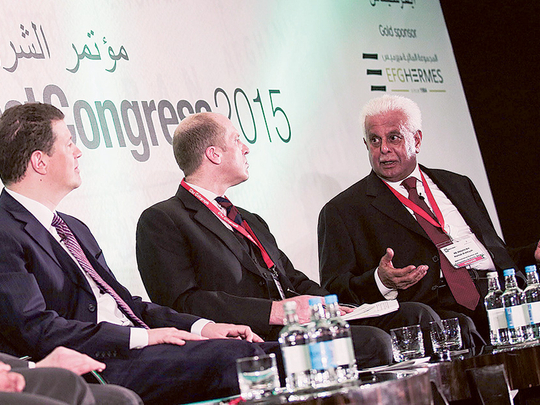
It is something over forty years since US president Nixon announced that we were “all Keynesians now”. The unfortunate experience of the 1970s went on to prove the point, as governments tried in vain to offset the effects on the rest of the world of the twin oil shocks of 1973/4 and 1978/9, producing the stagflationary conditions of unemployment and inflation together. Many deleterious effects have followed since that time, as today much of the West struggles again, now almost hopelessly, with deficits and compounded debt.
That’s history for you, and somehow it never goes away, as the Mayor of London Boris Johnson revelled in sharing with attendees at the Telegraph’s Middle East Congress last week in his stint marketing the event’s host city.
Warming to the theme of the benefits of openness towards talent and ideas, he treated the audience to the tale of how the same attitude ensured the longevity of Athens since its ancient rivalry with Sparta, the former striding forward with democracy and a formidable cultural legacy, the latter virtually disappearing without trace. Some listeners might also have reflected momentarily on a certain, current state of indebtedness, but that’s another story.
Oil, the lessons of the ages and the merits of embracing change were key elements in the conference discussion as it unfolded, as a succession of contributors looked forward to a better economic future for Mena, based on the challenges presented by the recent past, and the opportunity, ironically, that they bring if interpreted well.
Indeed, if we are anything at any time, we are all editors, adopting selective hearing or reading of both everyday and important issues, including debate on the region. Most assembled seemed determined to be optimistic, despite the Middle East’s various convulsions, if only because, as one speaker suggested, it is the only way productively to be.
Dr Fatih Birol, chief economist at the International Energy Agency (and recently appointed its next executive director), made a determinedly positive case for the region’s outlook, at least by specifying 2040 as the horizon to view, by which time the world’s likely call upon oil could only be satisfied by impressively increasing production from Opec’s members. Notably, US shale’s impact will have tailed off well before then.
William Danvers, deputy secretary-general of the OECD, was circumspect by comparison, urging better governance across Mena, as the slowdown in both average and especially per capita growth rates in the post-Arab Spring era since 2011 pointed to outstanding deficiencies. His nomination of concerns about youth employment, greater female participation in the labour force, public-private partnerships and regulatory overhaul towards trade effectively recounted a long-established list.
Other delegates, from the region itself, acknowledged its present limitations and the need for quite a profound psychological shift.
Yasar Jarrar, partner advisor at Bain & Company, referred to regrettable characteristics of distorted labour markets, an entitlement mentality, and inflated state sector salaries, as the Gulf nations continued along the lines of “welfare states”. Given local budgets turning into deficit, “conversations are now on the table” about adjustments such as the introduction of taxes, he noted.
Majid Jafar, CEO of Crescent Petroleum, bemoaned the persistence of another “70s mentality”, that of regional producers trying to limit the share of energy revenues accruing to partnering international oil companies (IOCs), so restricting the upside of potential output and earnings to the countries concerned, besides to those firms.
Oil remains “a poisoned chalice” in such terms, remarked Ahmed Demerdash Badrawi, managing director of SODIC, joining several from the platform extolling the ability of the private sector to “deliver and perform” in place of government and its significant burdens of regulation.
At the same time, Dr Haidar Al Yousuf, director of funding at the Dubai Health Authority, insisted that in fact the public sector itself could secure “tremendous” gains, provided efficiencies and accountability were properly engaged. Dubai’s rebound since the financial crisis was evidence that “difficult times make you dig deep and be better”, he argued.
As for oil’s prospect, which inevitably continues to inform the whole region, it was Abdallah bin Hamad Al-Attiyah, president of Qatar’s Administrative Control and Transparency Authority and former president of Opec, who took us back to basic principles, and the matter of the mindset.
Opec is no longer the oil market’s swing producer, he declared, and the region needs to “wake up, not be dreamers”. Exporting nations should not expect a return to the $100 barrel, or even seek it somehow, he advised. Instead, they should recognize that $60-70 is “perfectly healthy”, and we can all live with that. Without a concrete way forward, having an emergency meeting of Opec might only make things worse amid faltering sentiment, he cautioned.
Realism, pragmatism, and a sense of history. It’s not only the Gulf and Middle East that could do with regular doses of that sort of input.












